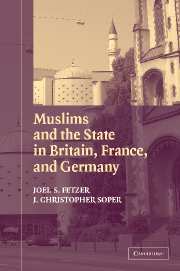Book contents
- Frontmatter
- Contents
- List of Figure and Tables
- Preface
- 1 Explaining the Accommodation of Muslim Religious Practices in Western Europe
- 2 Britain: Establishment Religion and Islamic Schools
- 3 France: Laïcité and the Ḥijāb
- 4 Germany: Multiple Establishment and Public Corporation Status
- 5 Public Attitudes toward State Accommodation of Muslims' Religious Practices
- 6 Integration and Muslim Practice
- Appendix: Survey Characteristics
- Glossary of Non-English Terms
- Bibliography
- Index
2 - Britain: Establishment Religion and Islamic Schools
Published online by Cambridge University Press: 05 September 2012
- Frontmatter
- Contents
- List of Figure and Tables
- Preface
- 1 Explaining the Accommodation of Muslim Religious Practices in Western Europe
- 2 Britain: Establishment Religion and Islamic Schools
- 3 France: Laïcité and the Ḥijāb
- 4 Germany: Multiple Establishment and Public Corporation Status
- 5 Public Attitudes toward State Accommodation of Muslims' Religious Practices
- 6 Integration and Muslim Practice
- Appendix: Survey Characteristics
- Glossary of Non-English Terms
- Bibliography
- Index
Summary
The religious establishment makes possible a recognition of a person's right to put into action what he most sincerely believes in. It is a recognition of a person's most fundamental right – the right to practice their religion. We often find that under the guise of tolerance, secular viewpoints rob people of that fundamental right. There is much good in keeping the religious establishment intact.
Dr. Fatma Amer (2001), director of education and interfaith relations, Islamic Cultural Centre, London Central MosquePeople will contribute most strongly to our society from a strong sense of their own identity. Our society will not be enriched by people who are half themselves, and half not. Islam is not a threat to that. Islam is a reality.
Canon John Hall (2001), general secretary, Church of England Board of EducationThere is a realization by the government that Muslims are here, we are citizens, and we have to be treated equally. We are not asking for special treatment; what we want is fair treatment. You apply the same rules to us as you apply to anybody else.
Dr. Yaqub Zaki (2001), deputy director, the Muslim Institute.on its surface, nothing is particularly startling in Dr. Zaki's comment about the political and religious demands of Muslims in Britain. It is a staple for citizens of liberal political regimes to expect the state to treat like persons alike.
- Type
- Chapter
- Information
- Muslims and the State in Britain, France, and Germany , pp. 25 - 61Publisher: Cambridge University PressPrint publication year: 2004



